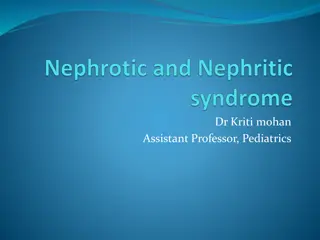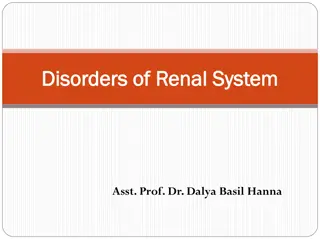Pathology of the urinary system
Focal segmental glomerulosclerosis (FSGS) is characterized by sclerosis of some glomeruli, while membranous nephropathy (MN) involves subepithelial immunoglobulin deposits. FSGS can lead to end-stage renal disease, with poor response to corticosteroid therapy. MN, on the other hand, shows diffuse ca
1 views • 20 slides
Understanding Nephrotic Syndrome in Pediatric Patients
Nephrotic syndrome is a significant chronic disease in children characterized by heavy proteinuria, hypoalbuminemia, edema, and hyperlipidemia. It is primarily idiopathic, with secondary causes including SLE, sickle cell disease, and infections. The pathophysiology involves glomerular dysfunction le
0 views • 43 slides
Understanding Diabetic Glomerulosclerosis in Renal Disorders
Diabetic glomerulosclerosis is a condition characterized by thickening of the glomerular basement membrane, leading to increased permeability. It belongs to diabetic nephropathy and poses a risk for pyelonephritis. The progression of this disease involves the deposition of proteins in the mesangial
0 views • 19 slides


